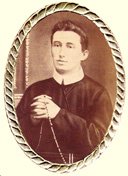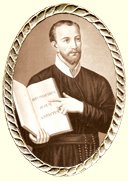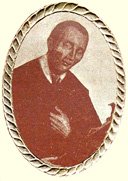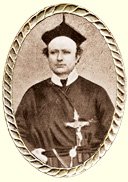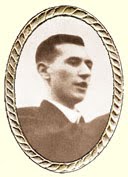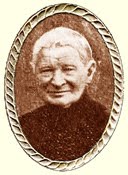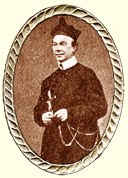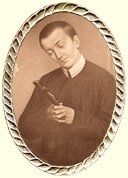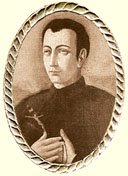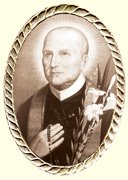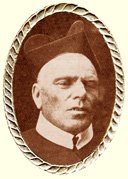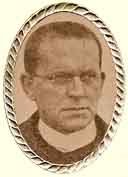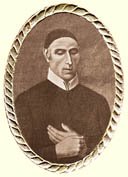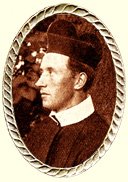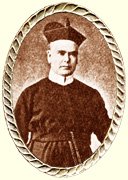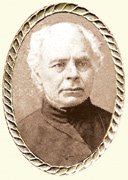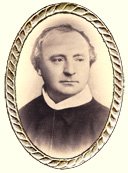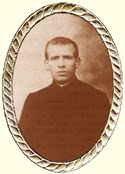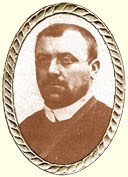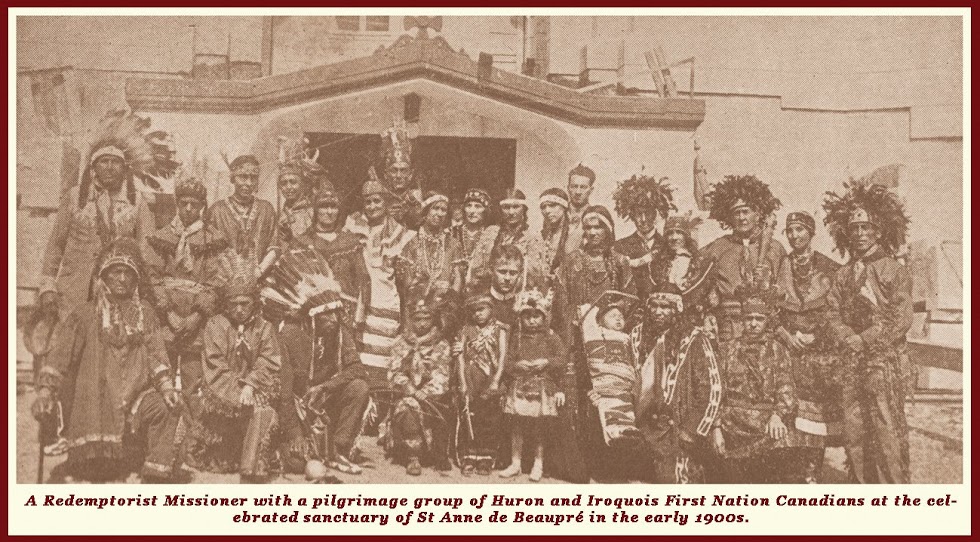Rev. Fr Leopold Petsch, C.SS.R. (1821 - 1882)
 The life of this venerable religious may be summed up in these words of Holy Writ: “The path of the just, as a shining light, goeth forward and increaseth even unto perfect day.” [Prov. IV, 18]
The life of this venerable religious may be summed up in these words of Holy Writ: “The path of the just, as a shining light, goeth forward and increaseth even unto perfect day.” [Prov. IV, 18]Father Petsch was a native of Moravia, then a province of the Austrian Empire. He was born on 23 August, 1821. His childhood and youth were passed in innocence and piety. When he had completed his twenty-first year, he entered the Congregation of the Most Holy Redeemer, and took vows at Mautern on 13 November, 1843, where he also completed his theological studies. Even at that early age, he gave proofs of his solid religious spirit, and particularly that of profound humility, which afterwards became the most distinctive trait of his character. He was ordained on 26 July, 1846.
America offered at that time a fertile field for the zeal and self-sacrifice of apostolic priests. Shortly after his ordination Father Petsch offered himself to labour in the far West for the most abandoned souls. In 1848 he and another Father came to America. His first field of labour was Baltimore, where the Redemptorists had charge of all the German Catholics within the city limits and far beyond. As the present systems of conveyance were then unknown, the pastoral care of the scattered flock entailed more than ordinary trouble and inconvenience. In October 1849 Father Petsch was transferred to Buffalo, where he laboured until April, 1851, from which time until May, 1852, he was engaged in work in Rochester.
During the following seven years, New York was the scene of his earnest apostolate. Four years he laboured among the faithful belonging to the church of the Most Holy Redeemer, and for the next three years he had charge of St Alphonsus’ Church in the same city. Here he displayed prodigious zeal. Immigrants found in him a guide and an advisor in the land of their adoption, and thus were preserved from the many dangers besetting their Faith. Men who had been strangers to religion for well-nigh a lifetime, adventurers, and people of every description flocked to the little church; and after listening to the earnest exhortations of Father Petsch resolved to forsake their evil ways.
They were soon reconciled by him to God in the Sacrament of Penance. He exercised a marvellous influence over the hearts of all, even the most obdurate sinners, and by his untiring efforts he brought many to the mercy-seat of God. The confessional was the principal sphere in which Father Petsch, throughout his whole priestly career, exercised his indefatigable zeal, and won the greatest number of souls to God.
In April, 1859, he was removed to Baltimore. In 1861 he became Rector of St Alphonsus’ Church in that city. In 1862 he was again transferred to New York as Rector. Three years later, we find him at Annapolis.
It was under him that the terrible drowning disaster took. Words fail to give an adequate idea of the shock which Father Petsch sustained when the sad news was brought to him. He was crushed by sorrow. Staggering to his room, he locked himself in, to commune with his God and beg for strength in that trying hour.
To remove him from the scene of such grief, the Superiors sent him to Pittsburgh, where he acted as Rector until 1871, when he was again appointed Rector of St Alphonsus’ Church, Baltimore. It was while stationed at this church that he was called one intensely hot day to administer the Last Rites of the Church to a dying man. On his way he was overcome by the heat, and in consequence of this sunstroke was brought to death’s door. He recovered however, but his health was never entirely restored.
In 1873, when Father William H. Gross, C.SS.R. the Superior of the Mission Church in Boston, Massachusetts, was elevated to the Episcopal See of Savannah, Georgia, Father Petsch was made Superior in his stead. In Boston he laboured in his own quiet way, but the blessing of God was with him. His zealous efforts were confined chiefly to the sacred duties of the confessional. The numerous penitents who chose him for their spiritual guide bear witness to the genuine apostolic zeal with which he administered this Holy Sacrament.
On 21 September, 1874, the first sod was turned for the foundation of the new church. It was Father Petsch himself who drew the lines, planted the stakes, and directed the labourers in the work of excavation. The new structure was completed on 7 April, 1878, and blessed by the Most Reverend Archbishop of Boston. On the following night, the inmates of the house were suddenly aroused by the terrible cry of “Fire!” The house was on fire, and some of the occupants barely escaped a most horrible death. Thus did good Father Petsch meet with numerous afflictions.
 This new disaster was a great blow to his already impaired health. For this reason he was allowed to resign his office in 1877. He was not the man, however, to take rest. He continued to labour until 14 June ,1882, when he was forced to take to his bed. On 19 June he was reduced to such a state of weakness that the physician declared he could not survive forty-eight hours.
This new disaster was a great blow to his already impaired health. For this reason he was allowed to resign his office in 1877. He was not the man, however, to take rest. He continued to labour until 14 June ,1882, when he was forced to take to his bed. On 19 June he was reduced to such a state of weakness that the physician declared he could not survive forty-eight hours.When the Rector questioned him as to what he would wish, he replied: “I want God.” His thoughts were all directed heavenward. On 20 June, 1882, his soul passed to its reward. Such was the life of this humble son of St Alphonsus.†




















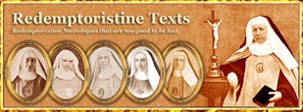
.jpg)









